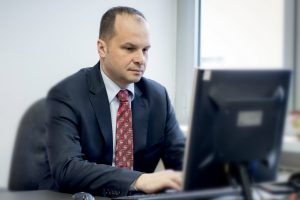The government, with Prime Minister Andrej Plenković at its helm, has succeeded in annulling all the positive results that we left as our legacy and has demonstrated that it has no strength or determination to tackle the problems surrounding it.
The Deputy Speaker of the Croatian National Parliament and a member of the Presidency of the Social Democratic Party (SDP), Siniša Hajdaš Dončić is well-known for his criticism of the ruling party and its work in the government. But he is also quite hard on certain opposition parties that undermine the dignity of the Parliament.

In an interview for Diplomacy & Commerce magazine, he argues that his party has far better solutions than the Croatian government for the issues such as economic challenges posed by Agrokor and INA. He also talks about more important political threats such as the country turning towards the right-wing option.
1. As a representative of the opposition and as the Deputy Speaker of the Parliament, what is your view of the current state of affairs in Croatia politically, economically and democratically? You said that a crawling conservative revolution was under way.
Instead of progressing, we’ve been regressing politically, economically and democratically. We are stuck, we are stagnating, and in many areas, we are even deteriorating. Unfortunately, in a very short time of just two years, this government, put together by the Croatian Democratic Union (Hrvatska Demokratska Zajednica – HDZ), has succeeded in annulling all the positive results that the SDP-led government had achieved in Croatia. After we pulled the country out of the crisis and the recession and restored order in it, industrial production is now down again, GDP growth has been slowing down, young people are leaving Croatia, and there are no new investments, while the government and PM Plenkovic have no strength, determination or will to face the problems surrounding them. One of these problems is certainly the crawling conservative revolution, which is slowly evolving into open sympathy for fascism.
2. There has been a lot of difficulty in regulating the Parliament’s work – frequent recesses, the issues with the uncertain majority and similar. What is a possible solution to this problem?
The Parliament is the central place of Croatian democracy, and apart from being a legislative body, it is also a representative body in which the most diverse political ideas and attitudes should and need to be heard. Unfortunately, the ruling majority, which is on rather shaky legs because it is cloned and composed of unnatural partners from the opposite side of the political spectrum while hanging by a thread with every major vote, does not like a well-argued discussion as it usually tries to skip or suppress it, sometimes even through a gross violation of democratic motives. It is unacceptable that they are refusing to hear the opposition’s proposals or include them in a debate agenda, even when all the formal prerequisites have been met. We should also mention here that sometimes some opposition members in the parliament justify the implementation of stricter discussion rules because of the way they behave, their attitude and the way they communicate. I am always in favour of a free, open, polite and, above all, well-argued debate, and against insults, aggression or abuse, not only of my fellow MPs but also of the public that watches parliamentary sessions. I am willing to support any changes to the procedure that would be made in that direction.

3. It’s only natural that opposition parties always advocate new elections. How much is the SDP ready for a possible new election and does the party have enough capacity party to enter the race soon considering the divisions and its current state?
We are not a party that wants to be in power for the sake of power. For us, as the SDP, the state is not a prey, but rather something that we want to serve responsibly. Both the party and I personally are interested in power in the context of having better and more efficient solutions for Croatia than our political opponents who have been perpetually demonstrating that they are not cut out to deal with the situation at hand. In this regard, I think it is necessary for this government to leave, and it is up to us to demonstrate to the citizens that we have the capacity and the knowledge to take on the responsibility for governing Croatia. Regarding the elections, we have to be prepared for them whenever they happen to be, and that is something that our citizens and our voters expect from us. The relations within our party should not affect our readiness to participate in an election at any given time. Different thinking, different solution proposals and even personal ambitions of any party member have to be treated in a positive manner because if that is missing, and if there is no dynamics in the party, there is no democracy either. Of course, everything has to happen under the framework of the relevant procedure, as the basis of the democratic system, and there has to be awareness that we, as in everybody in the party, are working on the same task which is to achieve a better life for all Croatian citizens.
4. The situation in Agrokor is one of the burning economic issues. What is the SDP’s stance on this issue (new management, Ramljak’s resignation, Todorić), and do you share the same views as your party? What is the solution to this whole process?
Unfortunately, there has been a lot of scamming going on in Agrokor, as it happens in most of the things that HDZ is involved in. This swindling has already begun with the non-transparent adoption of a law called Lex Agrokor, followed by the appointment of an entire army of advisers, a possible withdrawal of money from the company, etc. In this way, the whole process is significantly compromised and someone should be held accountable like, first and foremost, Martina Dalić, who has the highest political responsibility. The entire process of rescuing Agrokor has to be completed in a way to preserve jobs, maintain production and prevent Agrokor’s companies from going out of business, and this is something that we will definitely insist on and even help with. Furthermore, we expect more than just financial restructuring and new loans that would temporarily extend Agrokor’s life. We expect a serious organizational restructuring that will enable real and long-lasting sustainable and profitable business operations

5. The opposition has announced that it would instigate a motion of no-confidence against Martina Dalić. What is the opposition’s main reason for doing this and how realistic is the no-confidence vote considering that this would not be the first time that such initiatives of revocation and motion of no-confidence against the government are launched? Does Andrej Plenković’s government have the majority or do you have it?
We have already voiced our objections to Minister Dalić’s work, and these are, as I have just mentioned – swindling and non-transparent processes in Agrokor; from the appointment of trustees and advisers who have been receiving huge financial benefits to some other issues that involve her, such as conflicts of interest. Here, we are specifically talking about INA and Minister Dalić’s not being excluded from the decision-making process. We think that the arguments for the dismissal of Minister Dalić are more than sufficient. Whether these arguments are put above the personal interests of the MPs who make up the ruling coalition today and who make their living from working for this government, really does not depend on us. It is up to us to point out irregularities and demand responsibility, as well as ask for resignation. It is up to the people in power to demonstrate if their responsibility lies with the citizens, or with their party and their coalition buddies.
6. You were the Minister of Maritime Affairs, Transport and Infracture in the government led by Zoran Milanović. Currently, there are a number of projects which implementation has been announced and that are of great importance to Croatia. The Pelješac Bridge is one of them. Do you think that the construction of the bridge will start soon and are Chinese companies the right choice for contractors?
Most, if not all of the infrastructure projects we are talking about today, were prepared by the SDP-lead government. That’s the fact! However, we never saw these projects as party projects, but as national projects, and in this sense, we want them to be implemented regardless of who’s in power – HDZ or SDP. That also goes for the Pelješac Bridge. We have secured co-financing through the European Union institutions, and it is up to the present government to realize the project. A public procurement procedure was carried out and the Chinese consortium was selected as the most favourable bidder. I hope that the Chinese companies will do the job well. The best price is certainly one of the most important factors, but quality, safety and adhering to deadlines are as equally important. The government has to monitor and control that. That’s their duty!
7. You are known for being an unconventional politician so what is your view of Croatia turning right-wing? How much are people, who are leaving the country now more than ever, doing so because the right-wing inclination, in addition to escaping the bad economic situation? How is this going to affect future generations?
A U-turn towards radical right wing has never brought anything good to any country. Quite the opposite! The final result was always violence, conflicts, wars and tragedies. We do not want that! We want a good life for all our citizens; we want a tolerant society that adopts progressive and not backward ideas; we want Croatia to move forward, and not to further sink into the ghettoization. I am firmly convinced that a significant number of people leaving Croatia do so precisely because they want the same thing we do. However, they have also noticed that Croatia is turning conservative, that negative ideas are being supported and that society is becoming less tolerant. And there is also the corruption for which the state and the judiciary have no right answers. Trials last forever, and sentencing doesn’t even happen. The biggest punishment is community service like peeling potatoes or working in an old people’s home. People go where the situation is different! Unemployed people are not the only ones who are leaving. There are people with decent salaries who, apart from good wages, also want a good life for themselves and their families. It is up to us to do this in Croatia – provide good life for everyone.
8.In which way is the dispute over the border with Slovenia going to be resolved and how much do you, as a representative of the opposition, contribute to the decision making process and submission of proposals in the Parliament? Croatia also has an unresolved dispute over the border with Serbia. What is your take on this issue?
The Slovenian Prime Minister, Miro Cerar has resigned because of internal political relations in Slovenia. This means scheduling new elections, an election campaign, and then definitely a tougher stance on foreign policy issues, including the border issues with Croatia. We’ve seen this happen many times. I do not expect ongoing issues to be solved soon, i.e. certainly not until after the election. Still, I hope that all of the ongoing issues will be resolved in the spirit of good neighbourly relations and in a friendly way because neighbours are forever. Everything else would be bad for both Croatia and Slovenia. And this does not only apply to Slovenia, but to all of our neighbours, including Serbia.